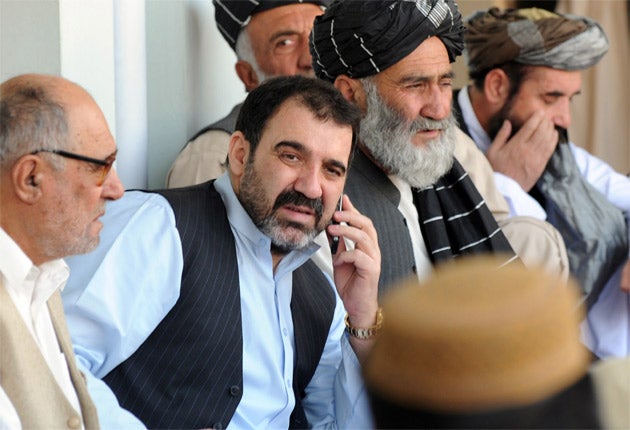Ahmed Wali Karzai: 'They have tried to kill me nine times already, they've got to do better than this'
What Afghan President's brother said over lunch just eight months before his assassination

A salvo of missiles had been fired at the home of Ahmed Wali Karzai just before we met there last November, but the Afghan President's brother was relaxed. "They have tried to kill me nine times already, they have got to do a bit better than this," he said, waving his arm at the damage, which amounted to a hole in the balcony wall, rubble and billowing dust.
The conversation over lunch was Afghan politics, the war, his brother the President – and football. AWK, as he is known, became particularly animated about the chaotic state of affairs at his beloved Chelsea. It was, he declared, not unlike Kandahar, the turbulent birthplace of the Taliban, before he began to sort out the province. His request, as we parted, was for a shirt signed by John Terry, "a real leader, tough guy."
Mr Karzai did not go on to say that he felt kinship with the Chelsea captain, who may, despite his own chequered history, have found the comparison slanderous. As the shogun of southern Afghanistan declared between mouthfuls of lamb kebab, "The stories about me are very hurtful. I have been accused of so many things that I have begun to forget them. The only thing I have not been accused of so far is prostitution."
There were few people in Afghanistan more controversial than Ahmed Wali Karzai. His enemies, and there were many, claimed that he ran the region like a Mafia don, grabbing highly lucrative international contracts and intimidating officials with his menacing power, while staying untouchable because of his blood ties with the country's ruler.
Halfway through the meal Mr Karzai rushed off to wash his hands and fetch a document which he insisted would absolve him of the charges.
It was a letter from the US Drugs Enforcement Agency which acknowledged that he was not, currently, the subject of a drugs investigation.
Mr Karzai waved the piece of paper: "This will be made public next week by the President in Kabul. Then, perhaps, these stories will stop."
For the West, AWK remained a conundrum. Back at the Kandahar military base Major-General Nick Carter, then the British commander of Nato forces in the area, mused: "He tells me he would far rather be watching Chelsea win the double than waste his time to settle disputes at his house in Kandahar."
His deputy, the US Brigadier-General Frederick "Ben" Hodges added: "I don't want to sound like an apologist, but AWK has done some good things. The thing to do is to keep the spotlight on him and see what happens. One shouldn't underestimate him. He does have a following and he is a pretty complex character."
It is indeed the case that Pashtun elders would flock to Mr Karzai's fortified home in Kandahar City for adjudication of disputes, or to pay homage. The hallways and sitting rooms were full of men in flowing robes and flowing beards. One chief from the Popolzai clan, Sayyid Naimtullah, was angry about the treatment Mr Karzai had received from Nato allies.
"They need him to fight the Taliban, they give him money, and then they say all these bad things about him," he said. "This is the way of foreigners, they use the Afghan people. But he has had a hard life, he can cope with just words."
It was this upbringing which made President Karzai and his brother emotionally close. There were occasional glimpses of what shaped Ahmed Wali Karzai. "Our father was assassinated, we are targets of the Taliban, al-Qa'ida, the ISI [the Pakistani spy agency]. We know we shall never really be away from our enemies. But that is not going to stop us, our people will keep on fighting."
The last conversation I had with Ahmed Wali Karzai was on the telephone when I told him that I had got him the Chelsea shirt. "I shall put that up as a prize in a competition," he told me. "We have a cricket team which will be very good. We want the same with football. Afghanistan has a great future, despite what you guys write."
Join our commenting forum
Join thought-provoking conversations, follow other Independent readers and see their replies
0Comments